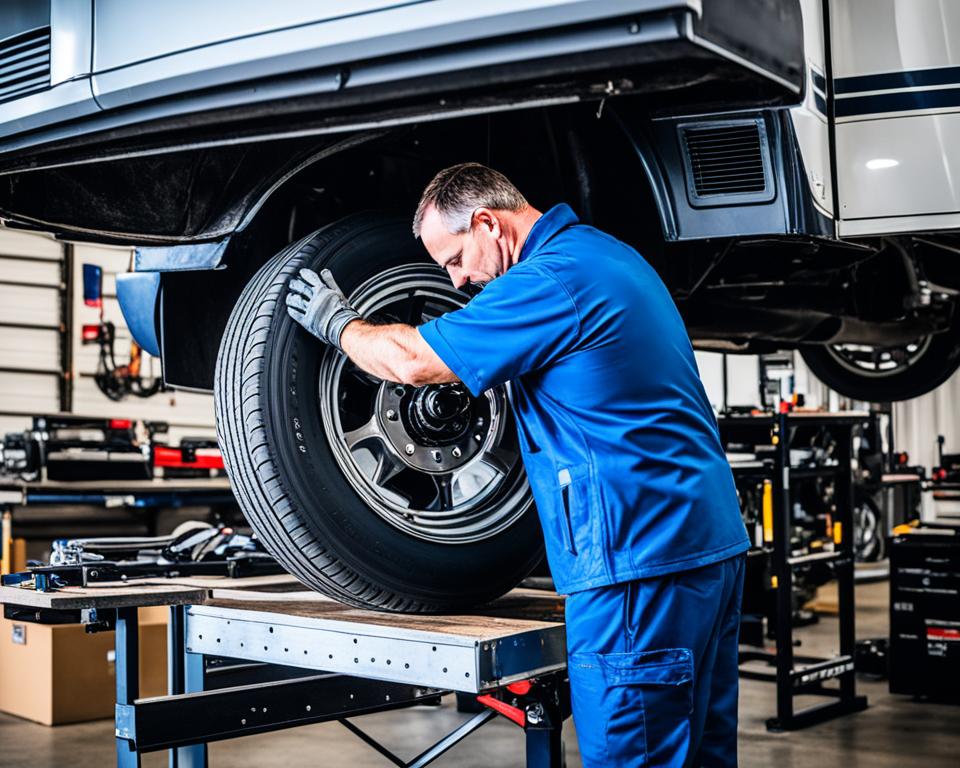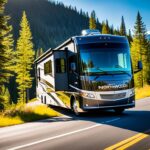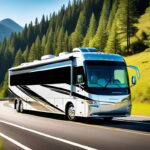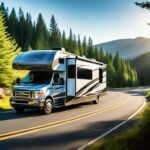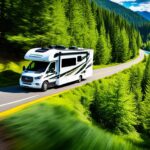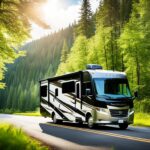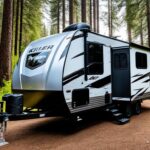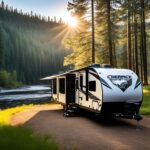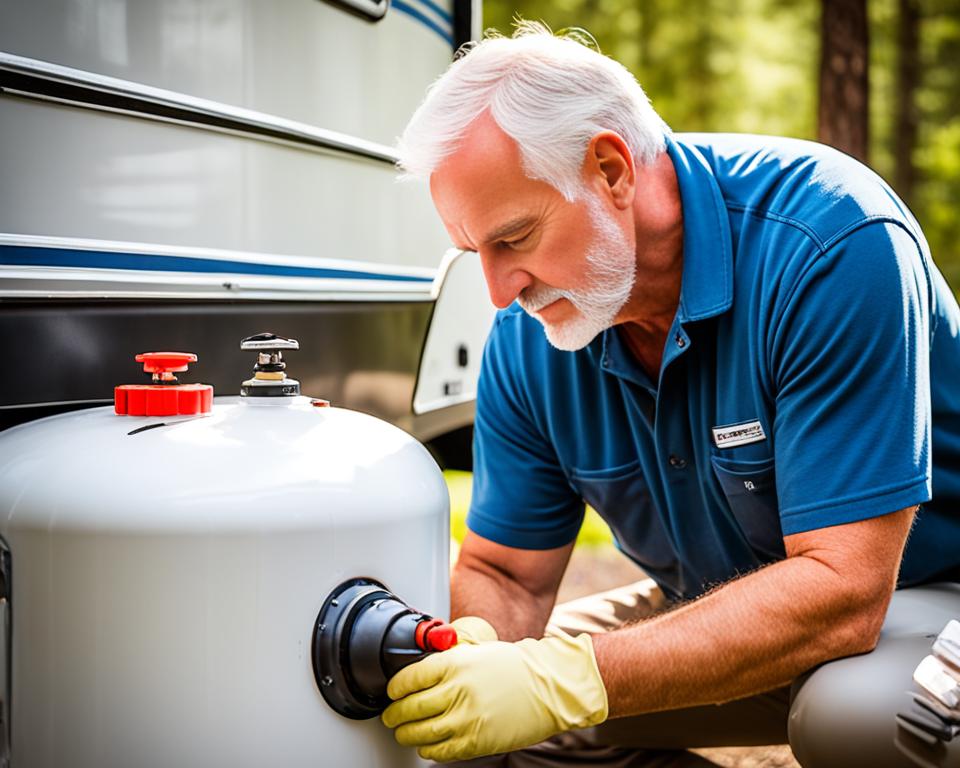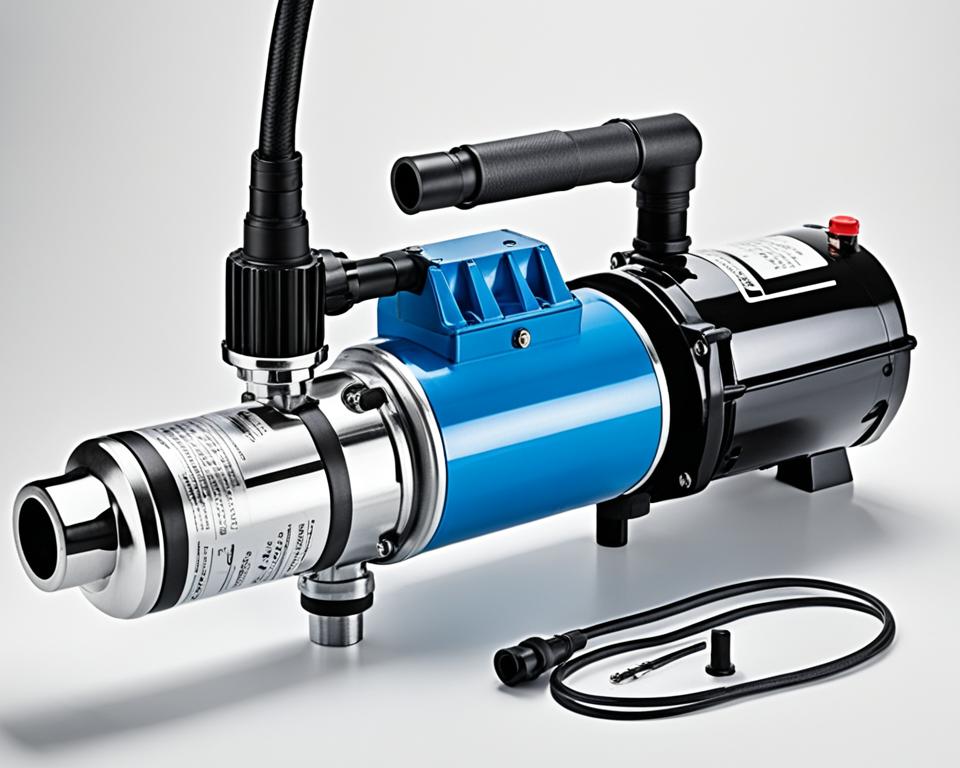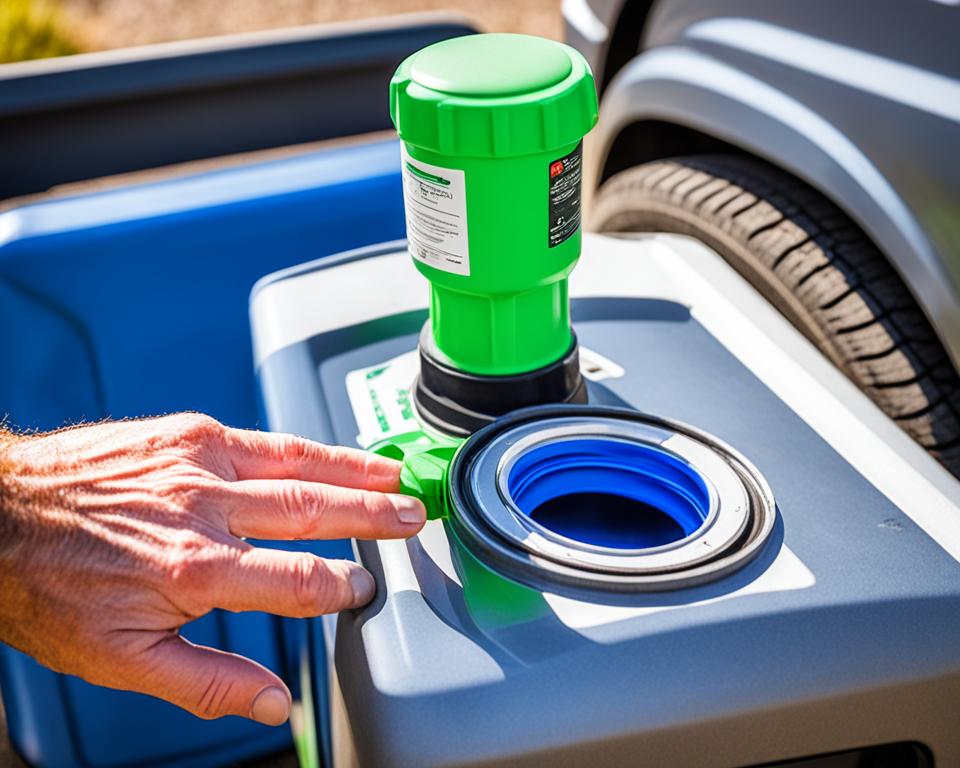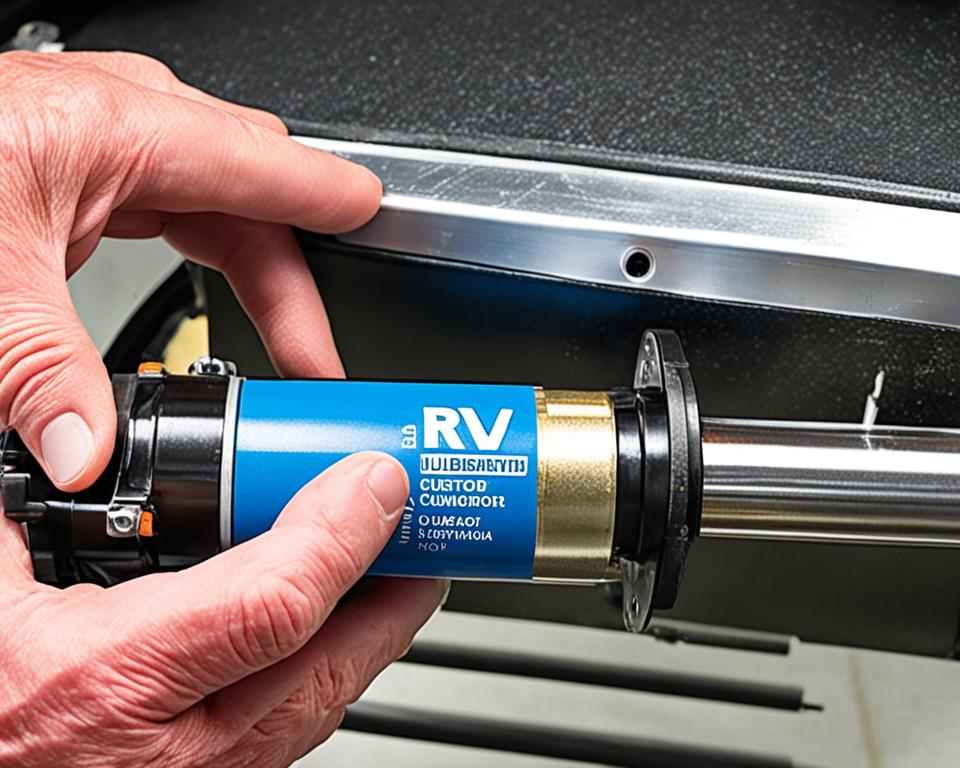Ensuring the safety and reliability of your RV is of utmost importance, and one crucial aspect of that is conducting regular chassis inspections. By following a comprehensive checklist, you can identify and address any potential issues with your RV’s chassis, keeping both you and your vehicle safe on the road.
Comprehensive RV chassis inspections involve assessing various areas, including the engine and generator, electrical items, water lines, propane system, holding tanks, exterior and interior of the RV, and reviewing important paperwork. By conducting these inspections regularly, you can catch any problems early and prevent costly repairs or accidents.
Whether you are a DIY enthusiast or prefer the expertise of a professional, RV chassis inspections should be prioritized to ensure your vehicle’s longevity. Regular inspections are especially crucial before embarking on long trips or purchasing a new or used RV.
Let’s explore the best practices for RV chassis inspections and how they contribute to overall RV maintenance and safety.
Key Takeaways:
- Regular RV chassis inspections are crucial for maintaining safety and reliability.
- A comprehensive checklist covers areas such as the engine, electrical items, water lines, propane system, holding tanks, and RV paperwork.
- Conducting these inspections regularly helps identify and address potential issues before they become costly repairs or accidents.
- RV chassis inspections should be performed before long trips or when purchasing a new or used RV.
- Both DIY enthusiasts and professional inspectors can ensure the longevity of an RV through thorough chassis inspections.
The Importance of RV Inspections
RV inspections play a crucial role in ensuring the safety and functionality of your recreational vehicle. Conducting regular inspections is essential in identifying potential issues and addressing them promptly, thus preventing further damage or unexpected breakdowns while on the road. By taking the time to thoroughly inspect all systems and components of your RV, including the chassis, you can guarantee that everything is in proper working order.
Investing in preventive maintenance through routine inspections is key to long-term RV maintenance and preserving a smooth and enjoyable travel experience. RVs are complex vehicles with various interconnected systems, and regular inspections help to maintain their optimal performance. By catching and resolving any potential problems early on, you can avoid costly repairs and ensure the safety of yourself, your passengers, and others on the road.
During an RV inspection, a comprehensive checklist is followed to cover all the essential areas of your vehicle. This includes examining the engine and generator, electrical items, water lines, propane system, holding tanks, exterior and interior components, as well as reviewing the necessary RV paperwork. Each of these areas plays a vital role in the overall functionality and safety of your RV, making it crucial to inspect them regularly.
“Regular RV inspections are a fundamental part of preventive maintenance, helping to maintain the safety, reliability, and overall value of your vehicle.”
By prioritizing regular RV inspections and preventive maintenance, you can have peace of mind knowing that your vehicle is in optimal condition for your next adventure. Whether you choose to conduct self-inspections or hire a professional RV inspector, the benefits of these regular inspections far outweigh the time and effort invested.
| Benefits of RV Inspections |
|---|
| Ensures the safety of your RV and its occupants |
| Identifies potential issues before they become costly repairs |
| Prevents unexpected breakdowns and delays during your travels |
| Prolongs the lifespan of your RV |
| Preserves the resale value of your RV |
Takeaways
- Routine RV inspections are crucial for maintaining the safety and functionality of your RV.
- Thorough inspections help identify potential problems and allow for timely repairs.
- By catching issues early, you can avoid costly repairs and ensure a smooth travel experience.
- Inspecting all systems and components, including the chassis, is essential for long-term RV maintenance.
- Regular preventive maintenance through inspections is key to preserving the value of your RV.
Come Prepared to Conduct an RV Self Inspection
Before conducting an RV self-inspection, it is important to come prepared with the necessary tools and knowledge. By being well-prepared, you can ensure a thorough and efficient inspection of your RV. Here are some essential steps to take:
- Create an RV Inspection Checklist: Having a comprehensive checklist is essential to ensure that you cover all the necessary areas during your inspection. Include items such as engine and generator inspection, electrical system checks, water line evaluation, propane system examination, and overall exterior and interior assessments. A well-organized checklist will help you stay focused and ensure that no crucial aspect is overlooked.
- Gather the Right Tools: To perform a DIY RV inspection, you’ll need a few basic tools. Equip yourself with a screwdriver, flashlight, tire pressure gauge, multimeter, and any other tools specific to your RV’s systems. These tools will enable you to inspect various components effectively and identify any potential issues.
- Familiarize Yourself with RV Systems: Take the time to familiarize yourself with the different systems and components of your RV. This includes understanding how the engine works, the electrical system’s layout, the water lines and valves, and the propane system’s operation. By having a good understanding of your RV’s systems, you’ll be better equipped to identify any irregularities or areas of concern during your inspection.
Expert Tip:
Consider researching online resources, RV owner manuals, or attending RV maintenance workshops to enhance your knowledge about RV systems and components. Learning about common issues and warning signs can help you conduct a more thorough inspection.
By coming prepared with a comprehensive checklist, the necessary tools, and a basic understanding of your RV’s systems, you’ll be ready to conduct a thorough self-inspection. Remember to approach the inspection process with patience and attention to detail. Your diligence will help ensure the safety and longevity of your RV.
What Does an RV Inspection Consist Of?
An RV inspection is a thorough examination of various components and systems to ensure they are in optimal condition. By conducting a comprehensive inspection, you can identify any potential issues and take necessary steps to maintain the safety and functionality of your RV.
Components of RV Inspection
During an RV inspection, the following components and systems are examined:
- Engine and Generator: The inspection includes checking the battery, fuses, rubber components, fluids, and overall health of the engine and generator.
- Electrical Items: All electrical components, wiring, and connections are inspected for abnormalities, loose connections, or signs of wear.
- Water Lines: Water lines are checked for leaks, damage, and proper functioning.
- Propane System: The inspection involves verifying the functionality and safety of the propane system.
- Holding Tanks: Holding tanks are examined for signs of leaks, cracks, or excess wear.
- Exterior Shell: The exterior shell is inspected for any damage, delamination, or discoloration.
- Storage Compartments: Storage compartments are examined for proper operation and secure latches.
- Roof and Air Conditioner: The roof and air conditioner are checked for leaks, damage, or any necessary maintenance.
- Hitch: The hitch, including the coupler mechanism and hitch pins, is inspected for proper functionality.
- Slideouts: Slideouts are examined for smooth operation and proper sealing.
- Wheels: The wheels are inspected for rust, damage, or loose components.
- Underbelly: The underbelly is examined for any signs of damage, wear, or loose components.
Interior Inspection
The interior inspection focuses on ensuring a comfortable and functional living space inside the RV. The following areas are carefully examined:
- Ceiling: The ceiling is checked for any signs of leaks, stains, or damage.
- Flooring: The flooring is inspected for wear, damage, or any necessary repairs.
- Windows: All windows are checked for proper operation, sealing, and any necessary maintenance.
- Walls: The walls are examined for any signs of damage, wear, or necessary repairs.
- Cabinetry: All cabinetry is inspected for proper function, cleanliness, and any necessary repairs.
- Furniture: The furniture is checked for functionality, comfort, and any necessary repairs.
- Electronics: All electronics, including the TV, radio, DVD player, and satellite system, are inspected for proper operation.
- Kitchen Appliances: The kitchen appliances are examined for proper function, cleanliness, and any necessary repairs.
Additionally, it is important to inspect the RV paperwork to ensure proper documentation and warranty coverage.
| Component/System | Inspection Points |
|---|---|
| Engine and Generator | Check battery, fuses, rubber components, fluids, overall health |
| Electrical Items | Inspect wiring, connections, and components |
| Water Lines | Check for leaks, damage, and proper functioning |
| Propane System | Verify functionality and safety |
| Holding Tanks | Examine for leaks, cracks, wear |
| Exterior Shell | Inspect for damage, delamination, discoloration |
| Storage Compartments | Check for proper operation, secure latches |
| Roof and Air Conditioner | Inspect for leaks, damage, necessary maintenance |
| Hitch | Examine coupler mechanism, hitch pins |
| Slideouts | Check for smooth operation, proper sealing |
| Wheels | Inspect for rust, damage, loose components |
| Underbelly | Examine for damage, wear, loose components |
| Ceiling | Check for leaks, stains, damage |
| Flooring | Inspect for wear, damage, necessary repairs |
| Windows | Check for proper operation, sealing, maintenance |
| Walls | Examine for damage, wear, necessary repairs |
| Cabinetry | Inspect for proper function, cleanliness, repairs |
| Furniture | Check functionality, comfort, repairs |
| Electronics | Inspect TV, radio, DVD player, satellite system |
| Kitchen Appliances | Examine for proper function, cleanliness, repairs |
By conducting a comprehensive inspection of these areas, you can ensure the safety, reliability, and overall condition of your RV, providing you with peace of mind as you embark on your travels.
Inspecting the RV Nervous System
When it comes to ensuring the smooth operation of your RV, inspecting the RV nervous system is of utmost importance. This involves examining various key components, including the engine, generator, electrical system, water lines, propane system, and holding tanks. By conducting thorough inspections of these vital systems, you can identify potential issues early on and prevent any unexpected surprises during your RV adventures.
Let’s take a closer look at each component:
-
Engine Inspection
Start by checking the battery to ensure it is functioning properly and securely connected. Inspect the fuses for any signs of damage or wear. Examine the rubber components, such as hoses and belts, for cracks or deterioration. It’s also essential to check the fluid levels and overall health of the engine to guarantee optimal performance.
-
Generator Inspection
The generator is responsible for providing power to various appliances and systems within your RV. Check the generator’s battery, fuses, and rubber components for any issues. Ensure it starts smoothly and runs efficiently. Conduct a thorough inspection of the generator to confirm its reliability during your travels.
-
Electrical System Inspection
The electrical system in your RV powers everything from lights to appliances. Inspect electrical items for any abnormalities or loose connections. Check the wiring, outlets, and switches to ensure they are in proper working order. This inspection will help prevent electrical issues and potential hazards.
-
Water Line Inspection
Water lines are integral to your RV’s plumbing system. Inspect the water lines for any leaks or damage. Look for signs of corrosion or wear. Ensuring that your water lines are in good condition will help prevent water-related issues and maintain a steady flow of clean water.
-
Propane System Inspection
The propane system provides fuel for appliances such as the stove, oven, and water heater. To ensure its proper functioning, inspect the propane system for leaks or damage. Check the connections and valves for any issues. Properly functioning propane systems are vital for safe and efficient RV living.
-
Holding Tank Inspection
Holding tanks store wastewater from the RV’s toilet and sinks. Regularly inspect these tanks for any signs of leaks or excessive wear. Check the valves and connections to ensure they are in good working order. Maintaining properly functioning holding tanks contributes to a clean and hygienic RV environment.
By conducting thorough inspections of the RV nervous system, you can address any potential issues before they escalate, ensuring the reliability and functionality of your RV. Regular maintenance and inspections are essential for a worry-free travel experience.
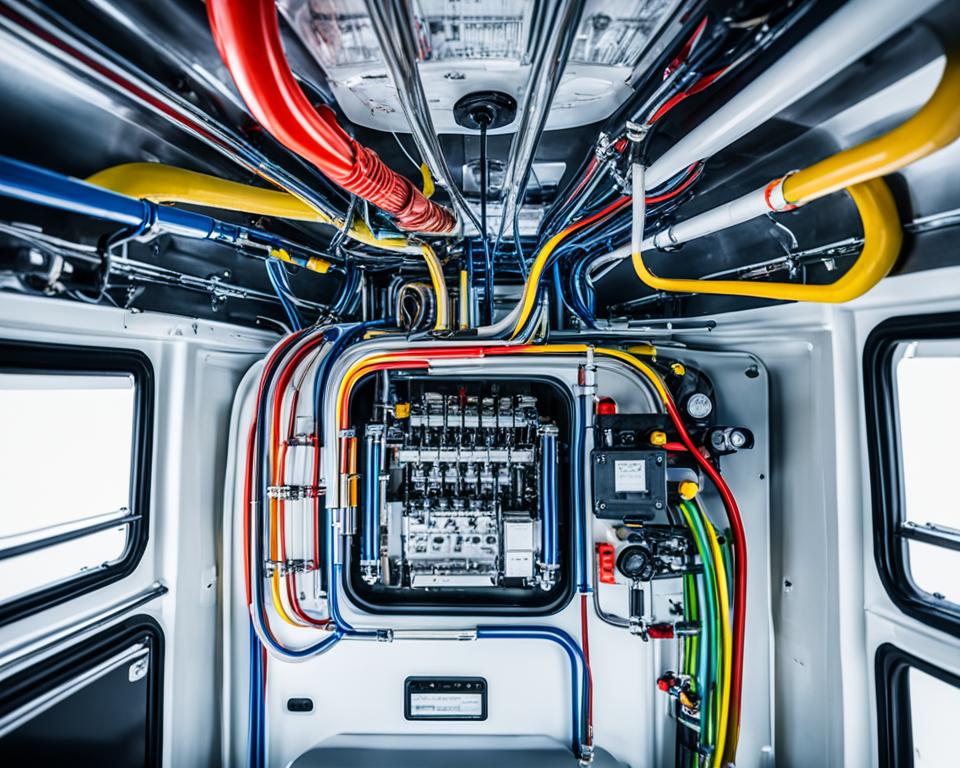
Exterior RV Inspection Items
When it comes to ensuring the safety and functionality of your RV, conducting an exterior inspection is essential. By thoroughly examining the exterior components, you can identify any potential issues and take proactive steps to address them. This section will guide you through the key elements to inspect during your exterior RV inspection.
Shell Inspection
Inspect the exterior shell of your RV for any signs of damage, delamination, or discoloration. Look closely at the sidewalls, front, and rear panels to check for cracks, dents, or other forms of wear and tear. Additionally, pay attention to any exposed seams or areas that may require resealing to prevent water intrusion.
Storage Bays Inspection
Ensure that the storage bays of your RV are in proper working order. Open each bay door and carefully examine the hinges, latches, and locks for any signs of damage or malfunctioning. Check that all storage compartments are secure and provide sufficient storage space without any obstructions.
Roof Inspection
The roof is one of the most critical areas of your RV to inspect. Use a sturdy ladder and perform a thorough inspection of the roof surface. Look for any signs of leaks, such as water stains, soft spots, or cracked sealant. Pay attention to the air conditioner unit and any roof vents, ensuring they are properly sealed and in good condition.
Hitch Inspection
Inspect the hitch and coupler mechanism to ensure they are in proper working order. Check for any signs of damage or wear, such as rust, cracks, or loose bolts. Ensure that the hitch pins are securely attached and that the safety chains are in good condition. Remember to refer to your RV’s owner’s manual for specific hitch inspection guidelines.
Slideout Inspection
If your RV is equipped with slideouts, inspect them for smooth operation and proper sealing. Extend and retract each slideout, checking for any abnormalities or resistance. Examine the seals and gaskets around the slideouts to ensure they are intact and not damaged. Properly functioning slideouts contribute to a comfortable and spacious interior during your travels.
Underbelly Inspection
Inspect the underbelly of your RV for any signs of damage, rust, or loose components. Look for any exposed wiring, damaged insulation, or pests that may have taken up residence. Ensure that all tanks, pipes, and connections are properly secured and free from leaks. A thorough underbelly inspection helps prevent potential issues and ensures the overall durability of your RV.
Stabilizer Jacks Inspection
Finally, inspect the stabilizer jacks to ensure they are in proper working condition. Check that the jacks extend and retract smoothly and that all parts, such as handles, cranks, and feet, are in good shape. Stabilizer jacks play a crucial role in providing stability and leveling for your RV, especially during extended stays at campsites.
By performing a comprehensive exterior inspection using the guidelines provided in this section, you can enhance the safety, durability, and overall functionality of your RV.
Interior RV Inspection Items
Inspecting the interior of your RV is essential to ensure a comfortable and functional living space. By conducting a thorough inspection, you can identify any issues with the ceiling, flooring, windows, walls, cabinetry, furniture, electronics, and kitchen appliances. Paying attention to these areas will help you maintain a pleasant and safe RV experience.
Ceiling Inspection
Look for any signs of leaks, stains, or damage on the ceiling. Water damage can lead to mold growth and structural issues, so it’s crucial to address any problems promptly.
Flooring Inspection
Inspect the flooring for wear or damage. Check for soft spots, cracks, or tears that may need repair or replacement. Ensure that the flooring is safe and free from any tripping hazards.
Windows Inspection
Check the windows for proper operation and sealing. Open and close each window to ensure they are functioning smoothly. Look for any cracks, leaks, or damaged seals that may need attention.
Walls Inspection
Examine the walls for any signs of damage or wear. Pay close attention to corners, seams, and edges. Look for cracks, holes, or discolored areas that may indicate underlying issues.
Cabinetry Inspection
Inspect the cabinetry for any signs of damage or instability. Open and close all doors and drawers to ensure they are functioning properly. Check for loose or broken hinges, handles, or latches that may need repair.
Furniture Inspection
Examine the furniture and driver’s seats for functionality and comfort. Test the reclining mechanisms, seat belts, and swivel features. Look for any tears, stains, or signs of wear that may require attention.
Electronics Inspection
Check the electronics inside the RV, including the TV, radio, DVD player, and satellite system. Ensure that they are in good working condition and properly connected. Test each device to verify functionality.
Kitchen Appliances Inspection
Inspect the kitchen appliances, such as the refrigerator, stove, oven, and microwave. Test each appliance to ensure they are working correctly. Check for any signs of damage, leaks, or malfunctions that may need repair or replacement.
By thoroughly inspecting the interior of your RV, you can address any issues and create a comfortable and safe environment for your travels.
Inspect the RV Paperwork
Inspecting the RV paperwork is an essential part of ensuring that all documentation is in order and up to date. By reviewing and verifying the RV warranty, maintenance records, registration, and title, you can ensure that your RV is properly documented and protected by warranty coverage if needed.
- RV Warranty Inspection: Begin by checking the warranty to ensure that it is still valid and covers any necessary repairs or replacements. Carefully read through the warranty terms and conditions to understand what is included and what may void the warranty.
- RV Maintenance Records: Review the maintenance records to ensure that regular servicing and maintenance have been performed on the RV. This includes routine checks, oil changes, filter replacements, tire rotations, and any other recommended maintenance tasks specified by the manufacturer.
- RV Registration: Verify that the RV is properly registered with the appropriate authorities. Check the registration documents for accuracy and make sure that the registration is up to date. This is essential for legal compliance and ensuring that your RV is recognized as roadworthy.
- RV Title: Check the RV title to ensure that it is clear and free of any liens. A clear title indicates that the RV ownership is not encumbered, providing peace of mind and ensuring a smooth transfer of ownership if needed.
By conducting a thorough RV paperwork inspection, you can be confident that your RV is properly documented and backed by warranty coverage. This inspection provides you with the necessary information and assurance to make informed decisions about your RV’s ownership and maintenance.
| Benefits of Inspecting RV Paperwork |
|---|
| Ensure warranty coverage for repairs and replacements |
| Verify proper maintenance and service history |
| Confirm current and accurate registration |
| Ensure a clear and lien-free RV title |
Inspecting the RV paperwork is just one important aspect of comprehensive RV inspections. In the next section, we will explore the pros and cons of purchasing an extended warranty for your RV.
Should I Buy an Extended Warranty for My RV?
Deciding whether to purchase an extended warranty for your RV is a personal choice. An extended warranty can provide peace of mind and financial protection against unexpected repairs or breakdowns. Consider factors such as the age and condition of your RV, the cost of potential repairs, and your travel plans. Research different extended warranty options, compare coverage and costs, and read customer reviews before making a decision. Consult with an RV expert or dealer for guidance on the best extended warranty for your specific RV.
Getting A Professional RV Inspection
While conducting a self-inspection is important, getting a professional RV inspection can provide a more thorough and unbiased evaluation of your RV’s condition. A professional RV inspector has the expertise and experience to identify potential issues that may be overlooked during a self-inspection. They will have specialized tools and knowledge to assess the various systems and components of your RV. The cost of a professional RV inspection varies depending on the size and complexity of the RV, but it is typically a worthwhile investment to ensure the safety and reliability of your vehicle.
By hiring a professional RV inspection service, you can benefit from:
- A thorough examination of all critical systems and components
- Precision and attention to detail
- Unbiased evaluation and expert recommendations
- Identification of hidden issues or potential future problems
- Compliance with industry standards and best practices
Furthermore, a professional RV inspection can save you money in the long run. By identifying any hidden or underlying issues, you can address them before they turn into expensive repairs or breakdowns on the road. It also provides you with peace of mind, knowing that your RV has undergone a comprehensive assessment by a qualified inspector.
When choosing a professional RV inspection service, consider their experience, reputation, and customer reviews. Ensure they offer a detailed RV inspection checklist that covers all critical areas. It’s also wise to inquire about the RV inspection cost upfront, so you can budget accordingly.
Investing in a professional RV inspection is a proactive approach to ensure the safety, reliability, and longevity of your RV. Whether you are buying a new RV or have owned one for years, a professional inspection can provide valuable insights and help you make informed decisions about maintenance or potential repairs.
Make the smart choice and schedule a professional RV inspection today to enjoy worry-free travels and peace of mind on your next adventure.
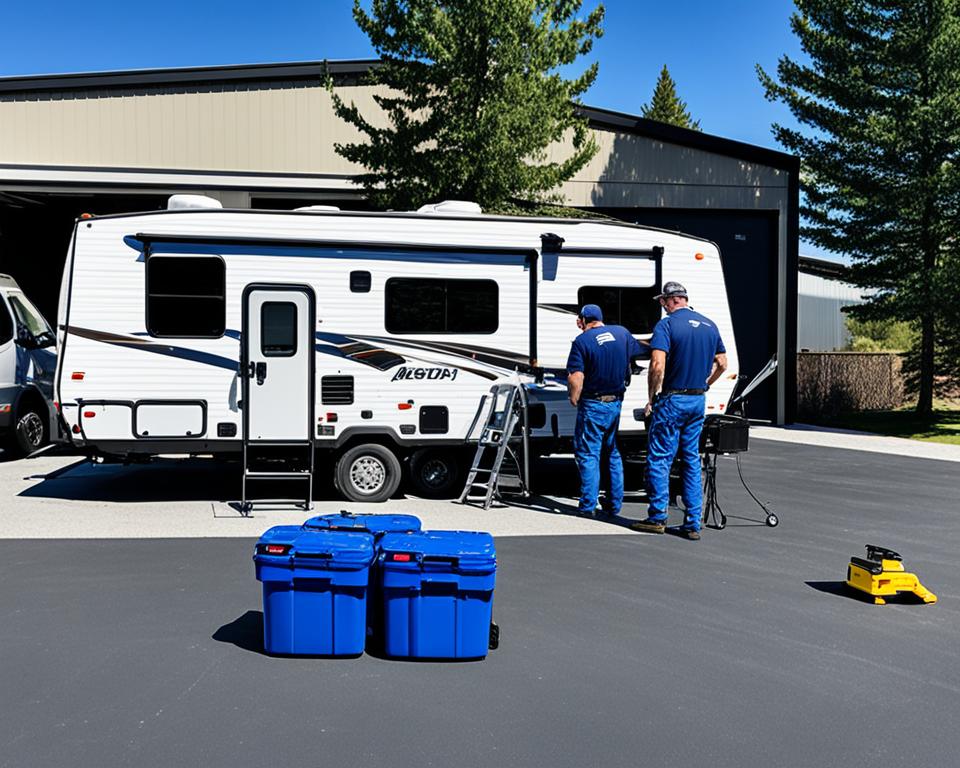
Related Reading
If you’re interested in RVing and want to learn more, check out these related articles:
-
12 Best Questions to Ask When Buying a New Camper
-
10 Best Questions to Ask When Buying a Used Camper
-
Should I Buy an RV or Camper? Here’s How to Decide…
-
Best RVs and Campers for Beginners
-
How to Find Cheap RV Rentals Under $100 a Night
12 Best Questions to Ask When Buying a New Camper
When buying a new camper, it’s important to ask the right questions to ensure you’re making a wise investment. Here are 12 questions to consider:
- What is the overall cost, including taxes and fees?
- What is the warranty coverage and duration?
- Does the camper come with any additional features or upgrades?
- What is the towing capacity of the camper?
- Are there any financing options available?
- What is the expected depreciation rate?
- Is there a service center nearby for maintenance and repairs?
- What is the expected fuel efficiency?
- How many people can the camper sleep?
- Is there a bathroom and shower in the camper?
- What safety features are included?
- Are there any discounts or promotions currently available?
10 Best Questions to Ask When Buying a Used Camper
Buying a used camper requires careful consideration to ensure you’re getting a reliable and well-maintained vehicle. Here are 10 questions to ask when buying a used camper:
- Can I see the maintenance records?
- Has the camper ever been in an accident or had any major repairs?
- What is the condition of the tires?
- Is there any water damage or signs of leaks?
- Has the camper been regularly serviced and winterized?
- Are there any outstanding liens or loans on the camper?
- Is the title clear and in the seller’s name?
- Are all the appliances and systems in working order?
- Has the camper been stored properly when not in use?
- Can I take the camper for a test drive or inspection?
Should I Buy an RV or Camper? Here’s How to Decide…
Choosing between an RV and a camper is a personal decision that depends on your travel preferences and needs. Here are some factors to consider:
- Size: RVs generally offer more living space and amenities compared to campers.
- Convenience: RVs typically have built-in bathrooms, larger kitchens, and more storage options.
- Maneuverability: Campers are usually easier to maneuver and navigate in tight spaces.
- Cost: Campers are generally more affordable than RVs, both in terms of purchase price and maintenance.
- Travel style: Consider whether you prefer a more compact and agile setup or a larger, more luxurious living space.
Best RVs and Campers for Beginners
If you’re new to RVing, these RVs and campers are great options for beginners:
- Class B Motorhomes: Compact and versatile, perfect for solo travelers or couples.
- Pop-Up Campers: Affordable and easy to tow, offering a comfortable camping experience.
- Travel Trailers: Versatile and spacious, suitable for families or longer trips.
- Class C Motorhomes: Combining the comforts of home with the convenience of a smaller footprint.
- Teardrop Trailers: Small and lightweight, ideal for weekend getaways or short trips.
Before making a purchase, consider factors such as budget, desired amenities, and intended usage.
How to Find Cheap RV Rentals Under $100 a Night
Renting an RV can be a cost-effective way to explore the open road. Here’s how to find cheap RV rentals under $100 a night:
- Plan Ahead: Reserve your rental well in advance to secure the best deals.
- Compare Multiple Rental Companies: Shop around and compare prices from different rental companies.
- Consider Off-Peak Times: Renting during non-peak seasons or weekdays can often result in lower rates.
- Opt for Smaller RVs: Choose a smaller, more compact RV to save on rental costs.
- Look for Special Discounts or Promotions: Check for discounts, promotional codes, or loyalty programs that can help lower the rental price.
- Book Longer Rental Periods: Many rental companies offer discounted rates for longer rental durations.
- Be Flexible with Locations: Consider renting from a location outside major cities or popular tourist destinations for potentially lower rates.
By following these tips, you can find affordable RV rentals that fit within your budget.
Conclusion
The importance of RV inspections cannot be overstated when it comes to ensuring the safety and long-term functionality of your vehicle. By following a comprehensive checklist and conducting regular inspections, you can identify any potential issues and address them before they become more serious problems. Whether you choose to conduct a self-inspection or hire a professional RV inspector, the key is to prioritize RV maintenance and safety.
Investing time and effort into RV inspections is essential for a reliable and enjoyable travel experience. By catching any issues early on, you can avoid costly repairs and potentially dangerous situations on the road. RV inspections play a crucial role in maintaining the overall condition of your vehicle, ensuring that all systems and components are in proper working order.
So remember, whether you’re a seasoned RV owner or new to the RVing world, make RV inspections a regular part of your maintenance routine. It’s a small investment of time and effort that can save you from major headaches down the road. Prioritize RV safety, and enjoy your adventures with peace of mind knowing that your vehicle is in top-notch condition.
FAQ
What is the importance of RV inspections?
RV inspections are crucial for maintaining the safety and functionality of your RV. Regular inspections help identify potential problems and allow for timely repairs, preventing further damage or breakdowns on the road.
How should I prepare to conduct an RV self-inspection?
To conduct an RV self-inspection, it’s important to come prepared with a comprehensive RV inspection checklist and the necessary tools like a screwdriver, flashlight, tire pressure gauge, and multimeter.
What does an RV inspection consist of?
An RV inspection consists of examining various components and systems, including the engine and generator, electrical items, water lines, propane system, holding tanks, exterior shell, interior living space, and RV paperwork.
What should I look for when inspecting the RV nervous system?
When inspecting the RV nervous system, you should examine the engine, generator, electrical system, water lines, propane system, and holding tanks. Look for any abnormalities, leaks, or signs of wear and tear.
What items should I inspect during the exterior RV inspection?
During the exterior RV inspection, you should examine the shell, storage bays, roof, hitch, slideouts, underbelly, and stabilizer jacks. Check for any damage, leaks, or rust, and ensure all components are in proper working order.
What should I check during the interior RV inspection?
During the interior RV inspection, you should check the ceiling, flooring, windows, walls, cabinetry, furniture, electronics, and kitchen appliances. Look for any signs of damage, leaks, or malfunctioning components.
What should I inspect when reviewing the RV paperwork?
When reviewing the RV paperwork, you should inspect the RV warranty, maintenance records, registration, and title. Make sure the warranty is valid, regular maintenance has been performed, and the RV is properly registered with a clear title.
Should I buy an extended warranty for my RV?
Whether to purchase an extended warranty for your RV is a personal choice. Consider factors such as the age and condition of your RV, the cost of potential repairs, and your travel plans.
Why should I consider getting a professional RV inspection?
Getting a professional RV inspection can provide a more thorough and unbiased evaluation of your RV’s condition. A professional inspector has the expertise, experience, and specialized tools to identify potential issues that may be overlooked during a self-inspection.
Where can I find more information about RVing?
Check out these related articles for more information about RVing, including buying guides, rental guides, and tips for beginners:
– “12 Best Questions to Ask When Buying a New Camper”
– “10 Best Questions to Ask When Buying a Used Camper”
– “Should I Buy an RV or Camper? Here’s How to Decide…”
– “Best RVs and Campers for Beginners”
– “How to Find Cheap RV Rentals Under $100 a Night”

